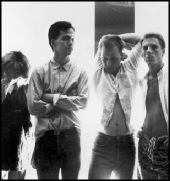“Emerson said, ‘Life is not so short that there is not always time for courtesy.'” —Gary Gilmore in The Executioner’s Song, by Norman Mailer, 1979.
I do not live by a motto, but if I did it would be “good manners count.” Seriously. My parents raised me to say “please” and “thank you,” whether I was asking you to pass the peas or fetch a Budweiser. I don’t wear hats indoors, I address older folks as “sir” and “ma’am,” and, although I’m admittedly lax about keeping my elbows off the dinner table, I feel powerfully guilty when I slip up—which is almost as good.
I get a kick out of the reactions such behavior elicits in the circles I run in, the surprised look on a bartender’s face when I use “the magic words” to order a cocktail—even if I’m wearing leather pants and a decrepit M�y Cre T-shirt. Acting like Gallant in Goofus’ clothing gives me a big charge.
Some folks will tell you good manners have no place in rock and roll, but my experience has been that the heaviest characters are often the most courteous. I once surprised Joey Ramone in the act of vacuuming his apartment before an interview because he was concerned I’d find it too dusty. And Marilyn Manson? He says that the most offensive thing someone can do is be rude to you in your own home. Yes, he’s flogged groupies with lunch meat, but if you sat Manson and Judith Martin (a.k.a. Miss Manners) down at a tea table together, they’d get along famously.
So, even though good manners are increasingly going the way of the dodo, I still get ruffled when folks act rudely. That’s why I stopped listening to the Pixies.
I’ve been interviewing musicians for over a decade now, and whenever folks ask whom my all-time worst subject is, I still say Frank Black. Or Black Francis, as he was known when we spoke in 1991. Frank—n饠Charles Michael Kitteridge Thompson IV—started off our interview by announcing that he had no intention of taking off his sunglasses, even though we were sitting in a conference room. He spent the hour stonewalling a set of thoroughly prepared questions. At one point, he baldly accused me of trying to make him feel stupid. (He also likened me to John Flansburgh of They Might Be Giants, although, in his defense, that wasn’t meant as an insult.)
I am not unsympathetic to the plight of the professional musician when it comes to the publicity mill. When Tom Waits or Radiohead announces they’re only doing half-a-dozen interviews to promote a new release, I appreciate where they’re coming from. An inordinate number of music journalists are in this racket primarily for free music and drinks. They have no qualms asking an artist the same dozen questions as the guy before them, and most likely the one to follow. Because I’m such a freak about time management, I strive to make the interlude an artist spends with me pleasant and entertaining, since he or she will never get those 45 minutes back. I do my homework and always try to be patient and cordial.
None of which seemed to matter to Black Francis. Maybe he felt self-conscious that the band’s last album, Bossanova, had sucked, and that its new one, Trompe le Monde, was only marginally better. Regardless, our unpleasant exchange left me feeling embittered toward the group. After rewriting my story a couple of times (my editor said I was cutting Frank too much slack after he acted like an asshole), I put away my Pixies albums. If “Monkey Gone to Heaven” or “Gigantic” came on the radio, I didn’t leap to shut it off, but that was the extent of my Pixies consumption for a decade.
Until a couple weeks ago, that is, when I purchased Complete ‘B’ Sides (4AD U.K. import), which features all 19 flip sides to the Pixies’ six original British singles, plus one cut off the U.S. edition of “Alec Eiffel.” It’s an uneven but fascinating document of the band’s evolution during its brief career; just compare the rerecorded version of “River Euphrates,” the live “Vamos,” or “Wave of Mutilation (UK Surf)” with the originals. Plus, the set includes the goofy, groovy “Manta Ray” (dismissed by its author in the liner notes as “a not-so-classic quickie”), a live take on “In Heaven (Lady in the Radiator Song),” from Eraserhead, two Neil Young covers, and “Make Believe,” Dave Lovering’s homage to teen queen Debbie Gibson.
So I finally stopped holding a grudge against Frank Black and blew the dust off Doolittle and Surfer Rosa. And I have been delighted to make their acquaintance anew. But I can’t say the same for Bossanova. That record still blows. And if that offends you, I’m sorry.






